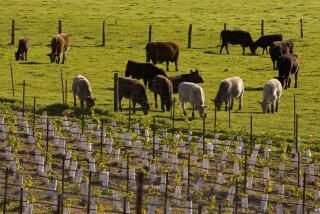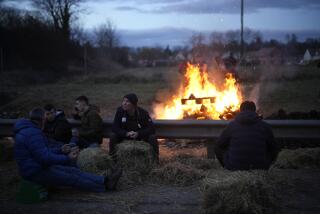AGRICULTURE : Activists Seek Ban on Shipping Livestock : British humane groups protest what they say are cruel conditions faced by animals bound for slaughter abroad.
LONDON — Activists here have taken more concerted steps to try to stop the shipment of live animals from Britain for slaughter abroad--a campaign that has generated not only headlines and nationwide discussion, but also some results.
The focus of the latest push for what some term a more humane treatment of animals has been on getting ports to prohibit live animal exports, joining major ferry companies in a ban on such a practice.
Activists have not halted shipments from North Sea harbors such as Brightlingsea in Essex. But their efforts have prodded Agriculture Secretary William Waldegrave to seek support in the European Union to prohibit cruel treatment of animals.
He and other officials have not been able to ignore the current campaign--in which protesters have tried to block trucks carrying calves and sheep to the ports--largely because it has been marked by the appearance of middle-class demonstrators: elderly pensioners, grandmothers and mothers with children.
“They got a couple of truck loads past us this week,” protester Maria Wilby said. “The vans full of sheep were protected by police along the road, and we only had some old people and young mothers and a few clerics out on the road to protest. The poor sheep were in a disgusting condition.”
The Brightlingsea protesters plan to continue their demonstrations, and the wharf owner has announced that he will shut down his animal exports when the current contract expires.
Animal exports are big business for British farmers. About 500,000 calves are shipped abroad as veal each year, along with about 2 million lambs. Most of the calves are headed for Holland and France, where they are kept for a few weeks then slaughtered for veal. Lambs are killed in continental countries after being reared on British farms.
“It’s basically a matter of profit,” said Peter Stevenson, an official with Compassion in World Farming, founded in 1967. “The French label the veal or lamb as slaughtered in France, and imply that it is French-grown, which is not the case.”
British activists claim that animals are cruelly jammed into large trucks, which travel from farms to ports, then are ferried across the English Channel or the North Sea to continental destinations, usually feeding pens.
“Sometimes, the journey takes many hours,” Stevenson said. “The animals often go without food and water for the whole trip. Many die on the trip. Further, the conditions under which they are reared abroad are appalling. Young calves are kept in crates--that is, small cages where they can hardly turn around--and are fed nothing but liquids in order to keep their flesh ‘white.’ ”
*
Activists assert that sheep and pigs are subject to the same abuses in transit and after they arrive at continental destinations. They say that animal treatment and conditions are particularly bad in France, Italy, Spain, Portugal and Greece--all EU members with strong agricultural lobbies that oppose reforms in animal care.
The Royal Society for the Prevention of Cruelty to Animals suggests that many abhorrent practices are because of modern, factory farming to increase production.
In Britain, the use of calf crates has been banned since 1990, and groups such as the humane society argue that cages should be banned throughout the EU.
Activists here insist that they are not being overly moral or claiming that animals have human feelings. But they argue that animals should not be made to suffer--even if they are destined for slaughter. Animals, they say, should be killed near where they are raised and the meat shipped abroad to consumers--”on the hook and not the hoof.”
*
This view has caught on among members of rapidly growing animal welfare organizations--Compassion in World Farming has mushroomed to 10,000 members--and among residents of animal-shipping ports such as Shoreham and Brightlingsea.
Activists regret that violence has occasionally erupted in their demonstrations. “We deplore violence,” Stevenson said. “Usually, those involved are outsiders: animal rights militants or just young people looking to take on the police. Most of our people have never been in protest demonstrations before.”
Stevenson is proud of the gains made by the protesters and suggests new targets for welfare groups, once shipments of live animals are stopped. “For too long,” he said, “we’ve turned a blind eye to how animals are treated. . . . I think that millions of people would be appalled if they really knew where their food was coming from--and what was done to animals and fowl--in their own name as consumers.”
More to Read
Sign up for Essential California
The most important California stories and recommendations in your inbox every morning.
You may occasionally receive promotional content from the Los Angeles Times.










